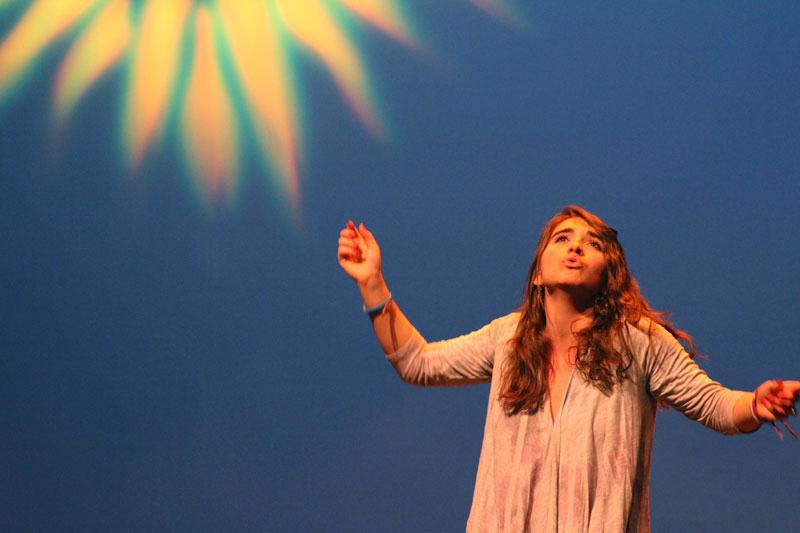
A group of male parishioners from a local church stood outside the Plaza Del Sol Performance Hall holding up images from the Bible and praying the rosary in a peaceful protest against a performance of the “Vagina Monologues.”
Guy Coulombre, Our Lady of Lourdes event organizer, said the church is protesting because the “Vagina Monologues” is “a lewd activist feminist play.”
“It encourages deviant lifestyles through deviant sexual practices through verbal feminine pornography,” Coulombre said.
The church sent out flyers urging its members to protest the production of the “Vagina Monologues” Thursday at CSUN.
Members of Our Lady of Lourdes Catholic Church, located in Northridge, and members of other surrounding churches marched from the church to the Plaza Del Sol theatre before the play opened its three-night run on campus.
SaDara Hill, a gender and women’s studies major and president of V- Club, said they’re here to bring awareness and stop violence against women.
“The “Vagina Monologues” brings the V-word out and reclaims it,” said Hill, 22. “The church calls it pornographic, yet it’s a part of the body.”
Hill, who served as executive producer of the production of the “Vagina Monologues,” said she thinks the church may have become more interested this year because the play is getting bigger and growing in supporters.
“The Cardinal Newman Society has been advocating V-day protests for years since the play came out in 1997,” Coulombre said. “The current protest became a current issue when the play was performed on at least 30 Catholic campuses against the Church’s directives. The church is now taking an active role in trying to put an end to the play.”
Hill said that while protesting outside the theatre, some church members told some of the performers they should change the name of the play to “Marriage Monologues” because the current name does not promote unity between men and women.
While the cast is entirely female, the crew consists of men and women who are all CSUN students and work on a volunteer basis.
This year will be the 17th year the play has been performed on CSUN’s campus, Hill said.
According to the V-day Web site, the play was started by New York playwright Eve Ensler back in 1996 and was first performed by one woman in a New York café. The “Vagina Monologues” is performed to raise money for V-Day. The ‘V’ in V-Day stands for Vagina, Victory and Valentine. In 10 years, the V-Day movement has raised $70 million.
“I want the public to know the church is only concerned for the spiritual well-being of the public,” Coulombre said.
“V-Monologues is wrong and it is spiritually and physically harmful to those that advocate the play,” Coulombre said. “It is contrary to the teachings the Church and other religions hold on the sanctity and definition of marriage and the proper relations between the sexes.”
Sophomore Michelle Dominguez, a communications major and the co-director of the “Vagina Monologues,” said these monologues are based on real women’s stories and they are not intended for shock value or to fill the play with implicit content.
“It’s real women’s stories and telling their stories gives a voice to women who have been silent about domestic violence and sexual assault,” said Dominguez, 19. “There are women who are Catholic and a part of V-Day and love being involved in both. I don’t think they need to be polar opposites. I wish the church would join us in trying to stop violence against women.”
Hill said all the proceeds will be donated. 10 percent will go to the Democratic Republic of Congo and 90 percent will be split between the Valley Trauma Center, which is a helpline for all types of issues and has a sexual assault emergency response team, and Hayven Hills a domestic violence support team.
Coulombre said the church is aware the proceeds go to raise awareness against abuse against women.
“I think the intentions are good,” Coulombre said. “However, I think the play undermines what the V-organization is trying to accomplish. I think the monologues do more irreversible damage than good as people are encouraged to look at sex as cheap and able to use for selfish purposes.”
“Some of the performers, and I’m sure some of the audience, have been involved in some kind of abuse and these plays are very therapeutic for them,” said Dominguez. “It’s about regaining power over our vaginas. There no longer this dark forbidden place and that effects how women feel about themselves.”
“Most specifically, the church has heard it is a sexually explicit and an offensive play favorably describing same-sex immorality and group self-abuse. It also describes the lesbian seduction and rape of a teenage girl as a ‘salvation.’ The play is often performed with the stated aim of raising awareness about violence against women and girls, a purpose that is thwarted by the play’s “pornographic and demeaning content,” Coulombre said.
“If a person wants to isolate individual sections, yes I can see how they might have an issue with some content, but they’re not looking at the deeper message and that is about bringing awareness,” Dominguez said.





